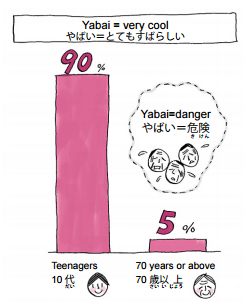across - by - from - in - of - on - over - to
The Vague Expression “Bimyou” is “Yabai” 「微妙」というあいまいな表現は「やばい」
The Agency for Cultural Affairs announced the results of an opinion poll (1 ) the Japanese language carried out between January and February, 2015.
文化庁は2015 年の1月と2月に行った国語に関する世論調査の結果を発表しました。
It became apparent that the meaning of some words had changed (2 ) these last ten years.
この10年間でいくつかの言葉の意味が変わってきていることが明らかになりました。
The word “yabai,” originally used to denote impending danger, nowadays is used (3 ) 90% of teenagers and 80% of people in their 20s to mean “very cool.”
「やばい」という言葉は、本来は危険が迫ることを表すのに使われますが、現在では10代で9割、20代で8割が、「とてもすばらしい」の意味で使っています。
On the other hand, only 5% of people aged 70 years or above use it (4 ) positive sense.
一方、70歳以上では5%しか肯定的な意味で使っていません。
“Uzai,” denoting something bothersome or unpleasant, is used (5 ) nearly 80% of teens, but by less than 50% of people aged 30 or over.
面倒くさいことや不快感を表現する「うざい」は10代の8割近くが使いますが、30代以上では5割弱と少なくなります。
In this way, there are words that can be interpreted differently depending (6 ) a person’s age group.
このように、年代により解釈が異なる言葉があります。
One conclusion that is evident (7 ) this survey is the increasing popularity year on year of the use (8 ) expressions that sidestep clear cut interpretation.
今回の調査から断定を避ける言葉づかいが年々広がっている傾向も明らかになっています。
Rather than saying “I think so,” 24.8% of people (9 ) their 40s say “Personally I think so.”
「私はそう思います」と言うべきところを「私的にはそう思います」と言ったことがある40代は24.8 %います。
When unable to decide if something is bad or good, as many as 66.2% of people (10 ) their 50s have a tendency to say “bimyou” (I have mixed feelings about).
善悪の判断がつかないときに「微妙」と言うことがある50代は66.2%に達しました。
This convenient word is widely used (11 ) the generations by those who wish to avoid responsibility (12 ) pretending they are unable to differentiate good from bad.
善悪の判断がつかないふりをして、自分の責任をさけるのに便利な言葉として幅広い年代で使われています。
In addition, it is often used (13 ) those worried that an awkward situation will arise if they express a different opinion than that of the person they’re talking (14 ).
また、相手と違う考えを言って、気まずい空気になるのを気遣って使われることも多いようです。
It could be said that (15 ) using vague language to avoid clearly stating one’s thoughts, this expression is rooted (16 ) the Japanese mindset.
これは、間接語を用いて自分の考えをはっきりと言わない日本的発想に根付いた表現法といえるでしょう。
However, due to the influence (17 ) globalization, it’s possible that the way Japanese people express themselves may change (18 ) the near future.
しかし、グローバル化の影響で近い将来に日本人の表現法が変化する可能性もあります。
The Agency for Cultural Affairs announced the results of an opinion poll (1 ) the Japanese language carried out between January and February, 2015.
文化庁は2015 年の1月と2月に行った国語に関する世論調査の結果を発表しました。
It became apparent that the meaning of some words had changed (2 ) these last ten years.
この10年間でいくつかの言葉の意味が変わってきていることが明らかになりました。
The word “yabai,” originally used to denote impending danger, nowadays is used (3 ) 90% of teenagers and 80% of people in their 20s to mean “very cool.”
「やばい」という言葉は、本来は危険が迫ることを表すのに使われますが、現在では10代で9割、20代で8割が、「とてもすばらしい」の意味で使っています。
On the other hand, only 5% of people aged 70 years or above use it (4 ) positive sense.
一方、70歳以上では5%しか肯定的な意味で使っていません。
“Uzai,” denoting something bothersome or unpleasant, is used (5 ) nearly 80% of teens, but by less than 50% of people aged 30 or over.
面倒くさいことや不快感を表現する「うざい」は10代の8割近くが使いますが、30代以上では5割弱と少なくなります。
In this way, there are words that can be interpreted differently depending (6 ) a person’s age group.
このように、年代により解釈が異なる言葉があります。
One conclusion that is evident (7 ) this survey is the increasing popularity year on year of the use (8 ) expressions that sidestep clear cut interpretation.
今回の調査から断定を避ける言葉づかいが年々広がっている傾向も明らかになっています。
Rather than saying “I think so,” 24.8% of people (9 ) their 40s say “Personally I think so.”
「私はそう思います」と言うべきところを「私的にはそう思います」と言ったことがある40代は24.8 %います。
When unable to decide if something is bad or good, as many as 66.2% of people (10 ) their 50s have a tendency to say “bimyou” (I have mixed feelings about).
善悪の判断がつかないときに「微妙」と言うことがある50代は66.2%に達しました。
This convenient word is widely used (11 ) the generations by those who wish to avoid responsibility (12 ) pretending they are unable to differentiate good from bad.
善悪の判断がつかないふりをして、自分の責任をさけるのに便利な言葉として幅広い年代で使われています。
In addition, it is often used (13 ) those worried that an awkward situation will arise if they express a different opinion than that of the person they’re talking (14 ).
また、相手と違う考えを言って、気まずい空気になるのを気遣って使われることも多いようです。
It could be said that (15 ) using vague language to avoid clearly stating one’s thoughts, this expression is rooted (16 ) the Japanese mindset.
これは、間接語を用いて自分の考えをはっきりと言わない日本的発想に根付いた表現法といえるでしょう。
However, due to the influence (17 ) globalization, it’s possible that the way Japanese people express themselves may change (18 ) the near future.
しかし、グローバル化の影響で近い将来に日本人の表現法が変化する可能性もあります。


 RSS Feed
RSS Feed